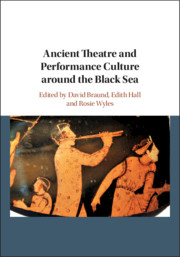Book contents
- Ancient Theatre and Performance Culture around the Black Sea
- Frontispiece
- Ancient Theatre and Performance Culture around the Black Sea
- Copyright page
- Contents
- Figures
- Notes on Contributors
- Preface
- Abbreviations
- Map
- Part I Approaches
- Part II Places
- Part III Plays
- 11 Space, Place and the Metallurgical Imagination of the Prometheus Trilogy
- 12 Fragmentary Greek Tragedies Set in the Black Sea
- 13 Black Sea Back Story: Euripides’ Medea
- 14 Dare to Believe: Wonder, Trust and the Limitations of Human Cognition in Euripides’ Iphigenia in Tauris
- 15 Visualising Euripides’ Tauric Temple of the Maiden Goddess
- Part IV Performative Presences
- Epilogue: Dancing around the Black Sea: Xenophon, Pseudo-Scymnus and Lucian’s Bacchants
- References
- Black Sea Index
12 - Fragmentary Greek Tragedies Set in the Black Sea
from Part III - Plays
Published online by Cambridge University Press: 12 November 2019
- Ancient Theatre and Performance Culture around the Black Sea
- Frontispiece
- Ancient Theatre and Performance Culture around the Black Sea
- Copyright page
- Contents
- Figures
- Notes on Contributors
- Preface
- Abbreviations
- Map
- Part I Approaches
- Part II Places
- Part III Plays
- 11 Space, Place and the Metallurgical Imagination of the Prometheus Trilogy
- 12 Fragmentary Greek Tragedies Set in the Black Sea
- 13 Black Sea Back Story: Euripides’ Medea
- 14 Dare to Believe: Wonder, Trust and the Limitations of Human Cognition in Euripides’ Iphigenia in Tauris
- 15 Visualising Euripides’ Tauric Temple of the Maiden Goddess
- Part IV Performative Presences
- Epilogue: Dancing around the Black Sea: Xenophon, Pseudo-Scymnus and Lucian’s Bacchants
- References
- Black Sea Index
Summary
This chapter explores the significance of the Black Sea region within the cultural imagination of Athens by examining the fragments of fifth-century tragedies with Black Sea settings. The fragmentary plays discussed include: Aeschylus’ Argo (or Oarsmen), Oreithyia, Phineus, Prometheus Unbound; Sophocles’ Chryses, Colchian Women, Drummers, Phineus (A and B), Phrixus, Root-cutters, Scythians; and Euripides’ Phrixus (A and B). The play titles and fragments, later hypotheses (plot summaries) and scholia (marginal comments), versions of the myths by other authors as well as iconographic evidence inform the assumed range of mythological episodes which could have been dramatised in these plays and establish the possibility of Black Sea settings. The limitations to the surviving evidence for each individual play make it impossible to establish every detail of their plotline with certainty. Nevertheless these fragmentary tragedies, as a set, can offer glimpses of the meaning of the Black Sea setting as a conceptual category and insights into its dramatic potential. The approach of examining the Black Sea as a conceptual category in tragedy is indebted to Froma Zeitlin’s seminal study on the significance of Thebes. This approach has, as yet, been under-exploited in the realm of dramatic fragments. Yet in the case of the material under discussion, it provides fresh insight by revealing that the Black Sea setting allowed engagement in (what we would now term) ‘colonial discourse’. Comparable treatments of the setting in other genres (epic, epinician and historiography) offer a framework for this analysis and establish the ‘colonial’ motifs (wonder, danger and appropriation) through which tragedy’s ideological exploitation of the region is understood. Furthermore it is suggested that the inclusion of distinctly Athenian aspects in these fragmentary plays, viewed within this ‘colonial’ context, imply an assertion of cultural domination. In the second part of the discussion, it is argued that insights into the dramatic potential of the Black Sea setting can be gained through assessing these fragments against established ways of thinking about tragedy, as: travel tragedy, katabasis drama, escape tragedy and ‘haunted’ (interperformative) plays. Overall the chapter aims to establish some possible parameters for what the tragic Black Sea setting could mean, both ideologically and dramatically, to a fifth-century audience. In the process, it proposes a new approach to dramatic fragments (examining a set, with a shared dramatic setting, through an ideological and dramatic axis), which has the potential to be extended to studies of material relating to other locales.
- Type
- Chapter
- Information
- Ancient Theatre and Performance Culture Around the Black Sea , pp. 252 - 266Publisher: Cambridge University PressPrint publication year: 2019



